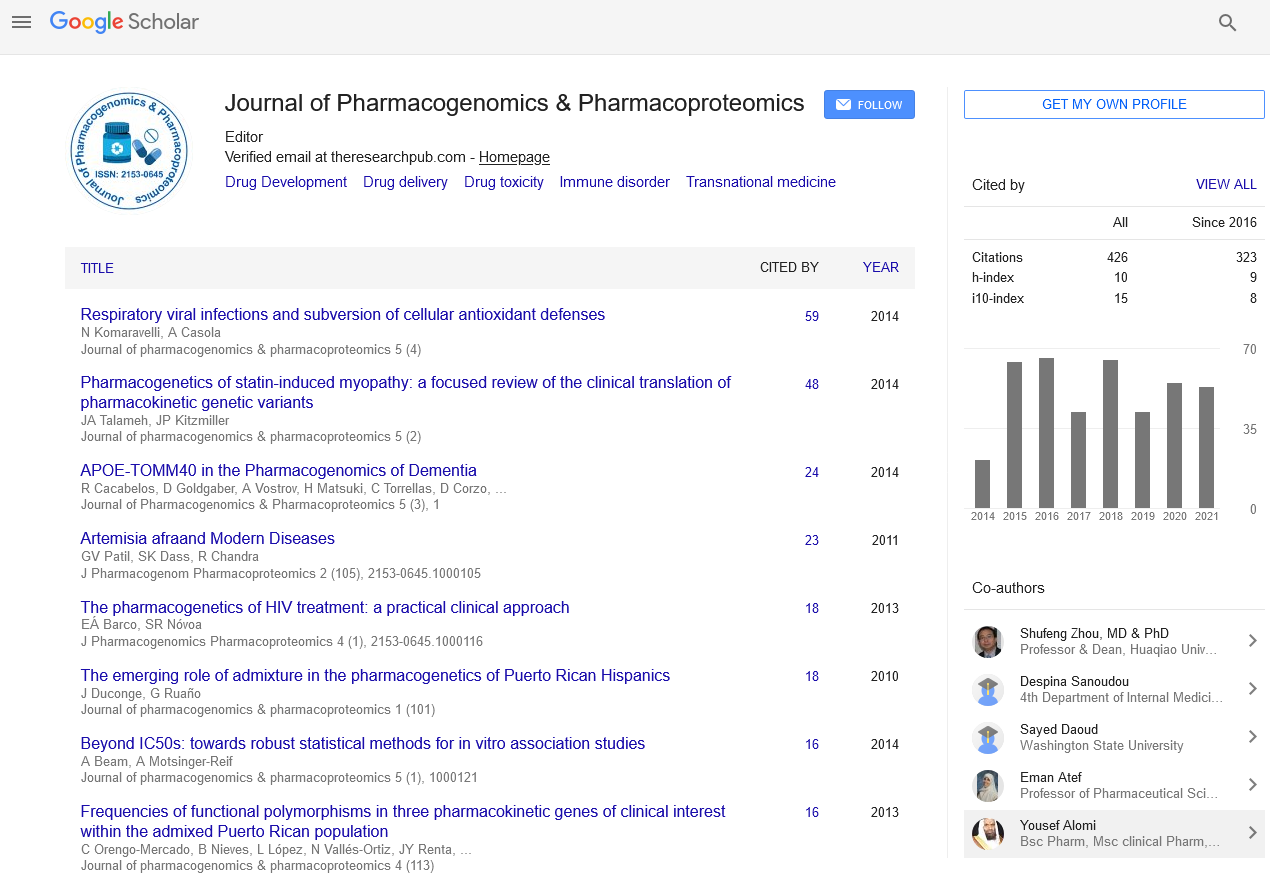Indexed In
- Open J Gate
- Genamics JournalSeek
- Academic Keys
- JournalTOCs
- ResearchBible
- Electronic Journals Library
- RefSeek
- Hamdard University
- EBSCO A-Z
- OCLC- WorldCat
- Proquest Summons
- SWB online catalog
- Virtual Library of Biology (vifabio)
- Publons
- MIAR
- Euro Pub
- Google Scholar
Useful Links
Share This Page
Journal Flyer

Open Access Journals
- Agri and Aquaculture
- Biochemistry
- Bioinformatics & Systems Biology
- Business & Management
- Chemistry
- Clinical Sciences
- Engineering
- Food & Nutrition
- General Science
- Genetics & Molecular Biology
- Immunology & Microbiology
- Medical Sciences
- Neuroscience & Psychology
- Nursing & Health Care
- Pharmaceutical Sciences
PGx-iCard: The intelligent pharmacogenetic test
4th International conference on Predictive, Preventive and Personalized Medicine & Molecular Diagnostics
September 22-23, 2016 Phoenix, USA
Juan C Carril, Oscar Teijido and Ramon Cacabelos
EuroEspes Biomedical Research Center, Spain
Camilo Jose Cela University, Spain
Posters & Accepted Abstracts: J Pharmacogenomics Pharmacoproteomics
Abstract:
The right medication in precise doses given at the right time for the right patient is ideal that any physician strive to reach when prescribing drugs to patients. This is particularly important for drugs that have a high risk of adverse reactions and narrow therapeutic margin. International pharmaco-economic studies conducted to evaluate the cost-effectiveness of drugs for prevalent diseases (cardiovascular disease, cancer, CNS disorders, hypertension, diabetes, hypercholesterolemia & dementia) evidence the fact that 10-20% of direct costs in these pathologies are from pharmaceutical nature. Assuming this reality and given that the lack of pharmacogenetic customization in conventional treatments increases the costs by 30%, presumably it concludes that the implementation of pharmacogenetic protocols in the treatment of chronic diseases, especially in disabled patients with long evolution, allow us to reduce direct and indirect pharmaceutical expenses by 25-40% depending on the primary diagnosis, concomitant diseases, clinical course of the diseases, polypharmacy, secondary intervention to mitigate adverse effects and pharmacogenetic profile of the patient. This pharmacogenetic panel analyzes a total of 12 genes coding for seven phase I enzymes (CYP2D6, CYP2C9, CYP2C19, CYP3A4, CYP3A5, CYP1A2, G6PD), three phase II enzymes (NAT2, UGT1A1, VKORC1) and two transporters (ABCB1 and SLCO1B1). The criteria for the inclusion of polymorphisms focuses on its genotype-phenotype correlation and its impact, valued as population frequencies in the Spanish population, discarding the analysis of polymorphisms whose presence in our population is not relevant. The EuroEspes Pharmacogenetic Card works as a custom formulary for each patient, so that, with the pharmacogenetic profile of the individual, the physician can manage the most suitable drugs for any condition for which he faces and the most effective dose for the patient in question.
Biography :
Juan C Carril is the Director of the Genomics and Pharmacogenomics Department at EuroEspes Biomedical Research Center, Institute of Medical Science and Genomic Medicine, Corunna, Spain. He has received his PhD from Santiago de Compostela University in 2000 defending the thesis “Genetic structure and profile of the populations of the Iberian Peninsula by means of markers (STRs and SNPs) of the human Y chromosome”. He has published more than 40 scientific publications in the fields of population genetics, forensic genetics, genetic epidemiology and pharmacogenetics and over 40 papers at national and international conferences.
Email: genomica@euroespes.com


